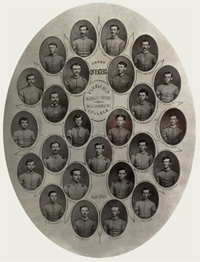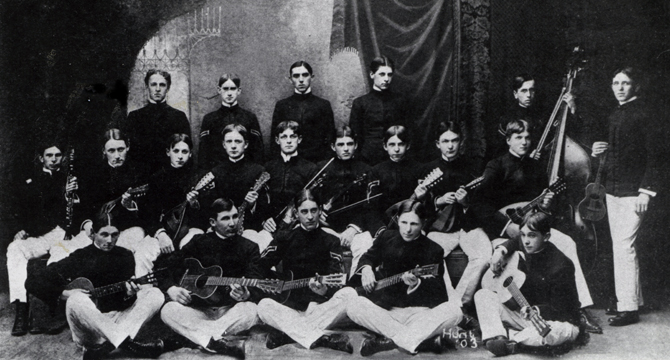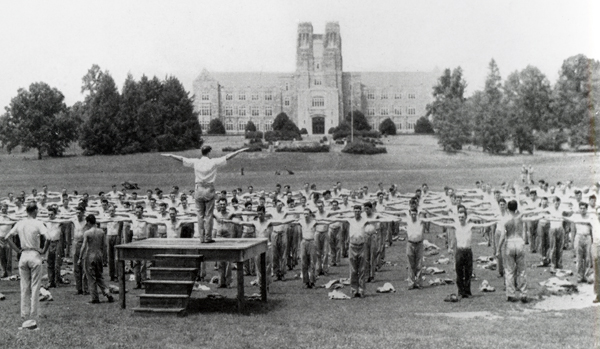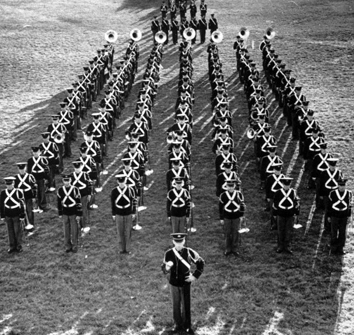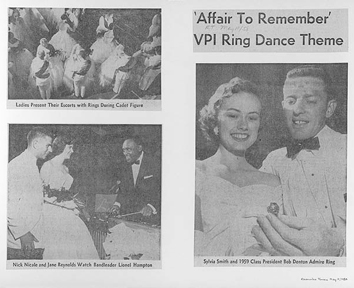 |
|
||
 |
|
|||
|
Summer ALUMNI ASSOCIATION 2010
|
 |
||||
| GENERATIONS of HOKIE ALUMNI by Melissa Vidmar | ||||||
 |
||
While the passion and excitement of our alumni and students remain strong, each generation has unique qualities. The characteristics below don't describe each of Virginia Tech's 250,000-plus alumni individually--after all, not every baby boomer went to Woodstock--but they do address commonly held perceptions of each generation. More likely than not, these characteristics influenced the Virginia Tech experience of each generation in a slightly different way. THE CIVIL WAR GENERATION: Born 1850-80 This generation experienced challenging times in a nation divided by the Civil War. West Virginia, which was created in 1863, separated Virginians in the western part of the state. As the nation recovered from war, the university, then called Virginia Agricultural and Mechanical College, graduated its first 12 students in 1875. THE LOST GENERATION: Born 1881-1900 Members of the "Lost Generation" were disillusioned by the large number of casualties of World War I. They were cynical, disdainful of Victorian notions of morality and propriety, and ambivalent about 19th-century gender ideals.
The G.I. Generation, or the "Greatest Generation," is characterized by loyalty, hard work, patriotism, respect for authority, self-reliance, and a strong sense of civic obligation; "sacrifice for the common good" was a widely accepted norm. The G.I. Generation takes traditional retirement, stopping work to pursue a life of rest and leisure. Having worked hard, often in manufacturing, many yearned for the freedom and fun of the "golden years."
This generation, known as the "Builders," saw America move from the farm to the city and from a blue-collar economy to the information age. Builders are hardworking, frugal, patriotic, cautious, dependable, and private about their feelings. More than 75 percent of the nation's wealth and more than 80 percent of its savings are controlled by this generation. Family: close family THE BOOMERS: Born 1943-60 Boomers were raised in an era of rapid growth and change. Technological advances meant more leisure time, and boomers were free to explore their feelings and experiment with life. Major cultural events--three dramatic assassinations (John F. Kennedy, Robert Kennedy, and Martin Luther King Jr.), the Vietnam War, and the Watergate scandal--caused many in this generation to become activists and to distrust societal institutions. The Cold War, consumerism, civil rights, women's issues, and the environment also occupy boomers' attention. Boomers are independent, cause-oriented, and media-informed. They are quality-conscious, fitness-preoccupied, and linked by a common heritage of rock music. Family: dispersed family |
|||||||||||||||||||||||||||||||||||||||||||||||||||||||||||||||||||||||||||||||||||||||||
 |
|||||||||||||||||||||||||||||||||||||||||||||||||||||||||||||||||||||||||||||||||||||||||
|
GENERATION X: Born 1961-81 This generation has experienced several new definitions of family and great personal insecurity. Recently, authors have described it as the postmodern generation. This generation values time over money and rejects the workaholic materialism of their parents. X-ers are not slackers; in fact, they must work to repay substantial student loans. Financing the ability to "get away from it all" and spending time with close friends are the best reasons to work for most Gen X-ers.
Mother: single mother Marriage: single parent or blended families Education: a way to get there Major influences: the media Teenage experience: information explosion, AIDS, trillion-dollar debt, and environmental woes Entertainment: TV (30-plus channels), VCR, and Nintendo Attitude toward authority: ignore leaders Value system: media Purchasing: struggling to purchase Perception: "us and them" (the boomers) GENERATION Y (Millennials): Born 1982-2001 Millennials may lead a seismic wave of change in the world. They are more numerous, more affluent, better educated, and more ethnically diverse and "unlike any other youth generation in living memory," according to one expert. Millennials also have positive social habits--focused on teamwork, achievement, and good conduct--and exhibit strong civic duty with confidence, sociability, and diversity. Family: comfortable with a loose family structureMother: single mother or single father Marriage: undetermined Education: an incredible experience Major influences: friends, media, athletes Teenage experience: overwhelming information, downsizing, living at home longer Entertainment: surfing the net, DVDs, PlayStation, and Xbox Attitude toward authority: leaders must respect you Value system: shop around Purchasing: online Perception: "Change is possible and good." Generational descriptions were pulled from research conducted by Dennis Gaylor, national director of Chi Alpha Campus Ministries, and Tom Tillar, vice president for alumni relations. |
|||||||||||||||||||||||||||||||||||||||||||||||||||||||||||||||||||||||||||||||||||||||||
|
|||||||||||||||||||||||||||||||||||||||||||||||||||||||||||||||||||||||||||||||||||||||||
| Editor's Page | Hok-E-News | In Retrospect | Letters to the Editor | Philanthropy | President's Message |
